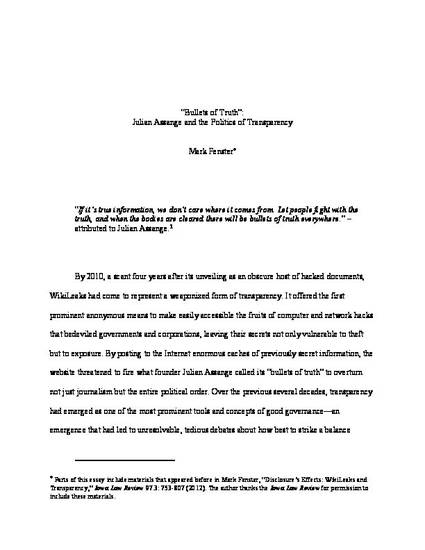
Contribution to Book
“Bullets of Truth”: Julian Assange and the Politics of Transparency
forthcoming
(2019)
Abstract
This essay updates (to early 2019) earlier work on the WikiLeaks story in order to consider what more recent developments reveal about the theoretical promise that Assange articulated at the time of the website’s emergence. Assange has characterized secrecy as both a form and symptom of corruption, and ultimately as the foundation of a “conspiracy” of governance that states like the U.S. inflict on their subjects and the world. He advocates a non-political, vigilante form of transparency in which WikiLeaks serves as a neutral entity that will save the public and free the world with information. He predicted that corrupt political orders would fall as the threat of exposure forces the collapse of their conspiratorial communication networks. But WikiLeaks has failed not only to save the world but to save itself from politics—and in the process has itself become a bit player in the larger geo-political drama that it had hoped to disrupt. Assange’s theory of information disclosure, as well as his assumptions about the state and governing institutions, have proven far too descriptively and normatively simple. More prominent, less radical theories of transparency should take note of these failures to the extent that they share many of his assumptions.
Keywords
- transparency,
- open government,
- leaks,
- hacking,
- Julian Assange,
- WikiLeaks
Disciplines
Publication Date
2019
Citation Information
Mark Fenster. "“Bullets of Truth”: Julian Assange and the Politics of Transparency" forthcoming (2019) Available at: http://works.bepress.com/mark_fenster/25/
